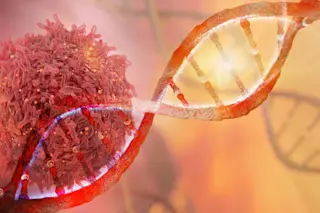Cancer is the second leading cause of death in the U.S., claiming around 600,000 lives in 2022 alone. A diagnosis can be devastating, as the disease can often resist treatment and spreads uncontrollably.
Now, a research team from The Jackson Laboratory (JAX) and UConn Health has identified a potential therapeutic strategy to halt or reverse tumor growth. Their study, published in Nature Communications, reveals how cancer cells disable a built-in "off switch" — and how reactivating it could stop tumor proliferation.
Cells function through an intricate network of proteins, each designed for specific tasks like metabolism, tissue repair, and immune defense. These proteins are built using genetic blueprints in our DNA. A process called alternative splicing enables a single gene to generate multiple mRNA transcripts — molecules carrying genetic instructions — allowing for protein diversity.
In healthy cells, this process maintains balance. Cancer cells, however, disrupt that process to fuel ...















